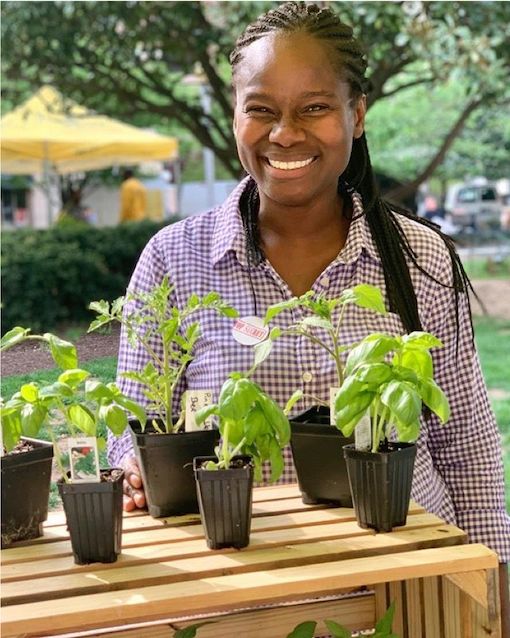An organic, Black woman-owned farm is thriving and bringing change to life just outside of Washington, DC.
It’s early spring in Washington, DC, which means the crowds are just beginning to return to the local farmer’s market. Among the most popular vendors is Deep Roots, an organic, woman-owned farm founded by Ann Sutton (AKA farmer Gale). At first glance, Sutton, 49 and smiling behind her mask, is easily mistaken for a young farm stand worker. After a few moments though, you quickly realize she is running things. She expertly answer customer’s many questions, while guiding her team.
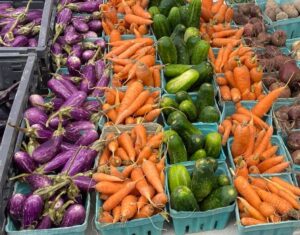
Spring bounty from Deep Roots’ Farm
The Deep Roots’ table is overflowing with crisp green kale and collards, unbelievably creamy sweet potatoes (I’ve had the pleasure of tasting them when baked), tomatoes, peppers, cucumbers, and less traditional selections like Japanese eggplants and turnips.
“What I do is a mixed crop of 20 to 30 different vegetables a season,” says Sutton of the impressive bounty of produce she offers each year.
Some 20 plus miles away from the farmer’s market, in Maryland, Sutton gave the Fierce team a tour of the newly purchased land that is Deep Roots’ future and shared the story of her entrepreneurial journey. In her company, two things are constant—her calm and confidence, yet as a Black woman, Sutton is part of a very small club. Just 1.34% of America’s farm producers are Black, even fewer are women of color. Yet, as Sutton explains her transition from federal government IT and accounting expert to landowner and grower, you get the sense that absolutely nothing could have stopped her from achieving her dream.
An urban girl who grew up in Guyana until age 7 before spending her early life in Brooklyn, NY, Sutton remembers a bit about her grandmother’s rural land, but for most of her life, she plied her green thumb indoors.
“What prompted me to take a leap of faith and become a farmer was that I tried growing on a very small plot in a community garden and the second year that I did that, I grew so much food in a 10-by-10 plot that I realized that if this was the mountain of food that you could produce in that little space … I could do this,” Sutton had relocated to Montgomery County Maryland by that time.
From that small plot, Sutton became a student of organic farming, using online learning, reading books and briefly working on someone else’s land before going it alone. “I thought I could learn what I needed by doing it, so I thought why am I spending all this time working for someone else?”
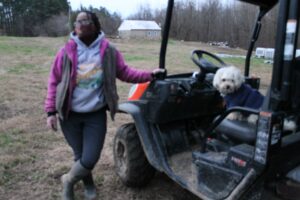
Sutton and Jermaine look over the land
As we walk the property, Sutton drops her mask and admits, while still flashing a dimpled smile, “It was a lot of trial and error. My first big failure was not knowing I needed to keep the deer out of my field. I came out one day and found that 500 ft of tomatoes, 200 ft of eggplant, and 400 ft of peppers – 60% of my crop — had been nibbled down to the ground,” she says.
That lesson came along with greater knowledge about the farmer’s market consumer—her primary client. “If I were to start over … I’d just begin with summer tomatoes, salad greens, carrots, eggplant and peppers … that’s what most shoppers buy.”
Each season, as she learned and earned more, Sutton decided to expand, eventually receiving an $800,000 loan, part a program for women and minority farmers, from the United States Department of Agriculture (USDA) to bring her full vision for Deep Roots to life.
Her plans blend the traditional, with contemporary concepts such as farm to table cuisine. Behind the wheel of her jeep, with unofficial chief farmhand — her dog Jermaine — riding shotgun – Sutton details her plans.
She gestures a few yards to our left, showing off rows of open-bottomed (for grazing) chicken coops that are home to ginger laying hens. Across the field from the hens, an old tobacco stripping barn, left by previous owners, is showing its age, but it has good bones and Sutton plans to turn it into a restaurant, along with a chef from DC’sToki Underground.
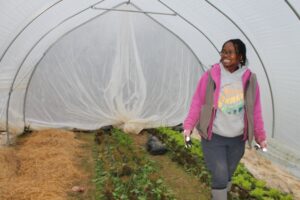
Sutton looks over the lettuce for the season
As we drive toward the road that will take us deeper into the property, Sutton casually points to a stake in the ground that will someday be her home. Under row, after row of canvas and tarp in the next field is the season’s lettuce, but Sutton is also experimenting with turmeric root and ginger. The next broad stretch of land reveals a team a worker raising a greenhouse, before we settle on the highest ground. Here, Sutton will make a home for cows, chicken and goats.
Healing our History
Sutton is part of small, but growing movement of Black farmers reclaiming land lost to our ancestors through decades of discrimination. Racial barriers aside, they are determined to succeed in agriculture. Even though the USDA’s discriminatory practices have been so persistent over decades, they are still being addressed in 2021 by the Biden Administration’s American Rescue Plan which includes $5 billion for Black farmers, a group left out of the previous administration’s COVID relief packages.
Telling their stories, raising awareness, and encouraging a younger generation through social media @blackfarmsmatter or #MakeFarmersBlackagain, the work of groups like The National Black Farmer’s Association support Blacks in agriculture and works to prevent further land loss.
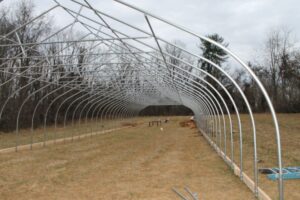
New greenhouse at Deep Roots Farm
In Upper Marlboro MD, where Sutton purchased her property, she represents generations of progress of a different sort. During the 1700s almost half of the county’s (Prince George) population was enslaved Africans. Upper Marlboro was 60 to 70 Black, populated by Black people working tobacco and other farms to build wealth for white residents. The historian of the Prince George’s Historical Society wrote “the contributions of the slaves to the building of colonial Prince George’s County cannot be overstated.”
Understanding the wealth and power that comes from the land is essential to Sutton’s dream. “I am on a council that has helped me to learn how many people there are, just in this small county, that are suffering from food insecurity,” Sutton says. “Growing your own food is the most liberating thing you can do. How much power is that … to have your own food source. You know that’s the most security that you can ask for, especially in times like these, in the days of COVID-19.” What an appropriate message our community as we address the many disparities the pandemic brought to light as part of National Minority Health Month. It is time for change.
Learn more about Deep Roots Farm or donate to the Building Fund
Sheree Crute is the editor-in-in chief and co-founder of FierceforBlackWomen.com

